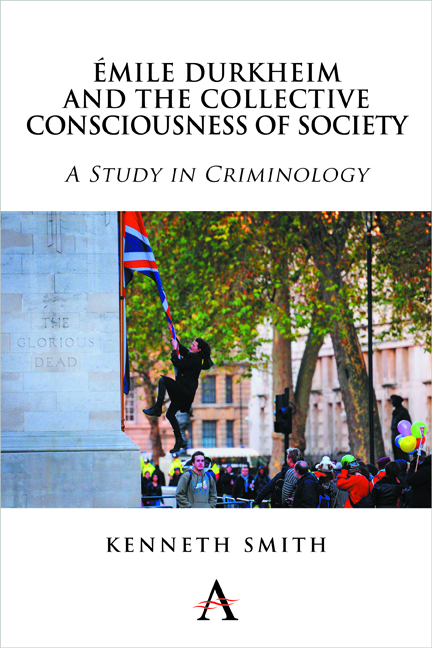Book contents
- Frontmatter
- Dedication
- Contents
- Epigraph
- Preface
- Introduction
- Part I The Concept of the Collective Consciousness of Society
- Part II The Form of the Collective Consciousness
- Preface to Part II
- Introduction to Part II: The Conditions of the Collective Consciousness of Society
- 4 The Form that the Collective Consciousness(es) of Society Takes in a Late-Industrial Society: I. Macro-sociological or ‘General’ Characteristics
- 5 The State as the ‘Organ’ of the Common Consciousness
- 6 ‘The Rule-of-Law’: A Case Study
- 7 The Form that the Collective Consciousness Takes in Early Twenty-First Century Britain: II. Micro-sociological, Individual or Small-Scale Factors
- Conclusion to Part II
- Part III Durkheim on Crime and Punishment
- Part IV Social Fact or Social Phenomenon? Durkheim's Concept of the Collective Consciousness as a ‘Social Fact’
- Part V Some Problems with Durkheim's Concept of the Common and Collective Consciousness
- Conclusion
- Appendix: On Paying a Debt to Society
- Notes
- References
- Index
7 - The Form that the Collective Consciousness Takes in Early Twenty-First Century Britain: II. Micro-sociological, Individual or Small-Scale Factors
from Part II - The Form of the Collective Consciousness
Published online by Cambridge University Press: 05 October 2014
- Frontmatter
- Dedication
- Contents
- Epigraph
- Preface
- Introduction
- Part I The Concept of the Collective Consciousness of Society
- Part II The Form of the Collective Consciousness
- Preface to Part II
- Introduction to Part II: The Conditions of the Collective Consciousness of Society
- 4 The Form that the Collective Consciousness(es) of Society Takes in a Late-Industrial Society: I. Macro-sociological or ‘General’ Characteristics
- 5 The State as the ‘Organ’ of the Common Consciousness
- 6 ‘The Rule-of-Law’: A Case Study
- 7 The Form that the Collective Consciousness Takes in Early Twenty-First Century Britain: II. Micro-sociological, Individual or Small-Scale Factors
- Conclusion to Part II
- Part III Durkheim on Crime and Punishment
- Part IV Social Fact or Social Phenomenon? Durkheim's Concept of the Collective Consciousness as a ‘Social Fact’
- Part V Some Problems with Durkheim's Concept of the Common and Collective Consciousness
- Conclusion
- Appendix: On Paying a Debt to Society
- Notes
- References
- Index
Summary
In the later 1970s and in the early 1980s most Britons have had the sense that the social contract is being renegotiated; that all the methods which distribute and redistribute burdens and benefits – the collective bargain, the statute, the judge's ruling, the executive decision, the routines of administration in central and local government, the customary expectations of work places and bus queues, and even the give and take of family life – that is, the arrangements for the social division of duty, wealth and welfare – are in debate, their principles and procedures in question.
(Halsey 1981, 44; emphasis added)Having looked extensively at a number of possible macro-sociological, or what Durkheim calls ‘general’, characteristics of the common and collective consciousness of society – including even the relationship between the state and the common consciousness of society – it is now necessary to turn our attention back to look a number of micro-sociological, or ‘individual’, characteristics of this phenomenon. Part II of Durkheim's list of ‘rules forbidding acts contrary to the sentiments of the collectivity’ (table v.1 in The Division of Labour), which Durkheim says has to do with those sentiments concerning individual purposes (see Fig. 6 below), directs our attention next to ‘sentiments concerning the person of the individual’ and mentions things like murder, wounding and suicide. Since we have already looked at some of these issues in Chapter 6 of this study, and will be looking at what Durkheim has to say about suicide in a later chapter, we will not do so again here.
- Type
- Chapter
- Information
- Publisher: Anthem PressPrint publication year: 2014



